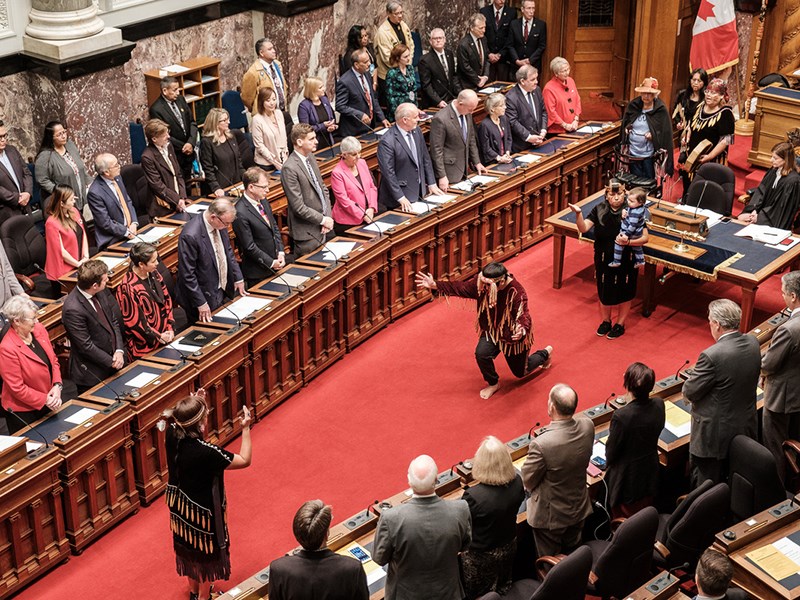Unanimous passage of Bill 41, the Declaration on the Rights of Indigenous Peoples Act, in the BC legislature, sets out a new relationship with first nations people, according to Powell River-Sunshine Coast MLA Nicholas Simons.
On Tuesday, November 26, BC became the first province to enshrine the legislation, which establishes the United Nations Declaration on the Rights of Indigenous Peoples (UNDRIP) as the foundational framework for reconciliation in BC, as called for by the Truth and Reconciliation Commission, according to a statement from provincial legislators and first nations leaders, including Scott Fraser, minister of indigenous relations and reconciliation; regional chief Terry Teegee, BC Assembly of First Nations; Cheryl Casimer, First Nations Summit; grand chief Stewart Phillip, Union of BC Indian Chiefs; and Adam Olsen, MLA for Saanich North and the Islands and member of Tsartlip First Nation.
Simons said he was pleased the government had initiated Bill 41.
“We said we would do this; that we would bring in legislation formalizing the United Nations declaration,” said Simons. “The legislation was passed unanimously. It’s historic legislation.”
Tla’amin Nation hegus Clint Williams said he thinks this is an exciting time for first nations across Canada, although it’s a BC bill. He said it shows progress on how first nations and government can work together into the future.
“I know the term reconciliation is probably overused, but at least now, with this bill, there is something to work from,” said Williams. “For the next little while, the minister and agencies across BC will have a base to start improving relationships among first nations across the province.
“Before, first nations were not too often recognized within the provinces. We were more dependent on federal agencies. Now, I think the province is getting involved. Kudos to British Columbia for taking this big, important step and initiative in recognizing the whole UNDRIP.”
Simons said the passage of the legislation was not the end of anything, but a beginning.
“What I see it as is the beginning of a formalized relationship that allows all of us to figure out ways to ensure everything we do in the province is seen with an eye to assuring the rights of indigenous people are recognized in the passage of legislation that follows,” said Simons. “It sets out a framework on how we are going to do that together and that’s the key.”
Simons said the legislation provides a guide to ensure the way people come together and the way laws are established in BC is done in a way that is in accordance with the principles set out in the declaration.
“It will ultimately provide more stability and certainty in terms of investments, relationships, and so in that regard, it has some practical application as well,” he added
Williams said it’s an exciting time for all British Columbians because now, there is the ability to start working together.
“Powell River has been a real leader in this area because we have been doing this somewhat as a collective between the regional district, the city and Sliammon at the time,” said Williams. “Now, it seems to be spreading throughout the province and it can only improve things for all British Columbians, not just the first nations. Moving ahead in a manner like this creates opportunities, not just for first nations, but for all.”
Williams said to see this piece of legislation pass is great news.
“I acknowledge that and think it’s a positive step,” he added. “Now, we just need to see it put into work in each of the ministries. Hopefully, we do put it to work and see it do some meaningful changes and improvements on old, outdated systems. Hopefully, it doesn’t just disappear after the photo op. I look forward to seeing the government workers being creative and thinking about how to improve things as we move forward.”



